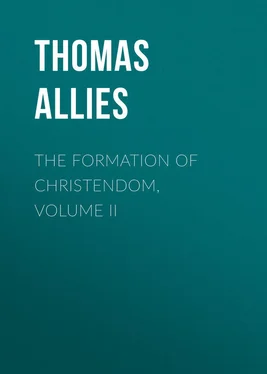Thomas Allies - The Formation of Christendom, Volume II
Здесь есть возможность читать онлайн «Thomas Allies - The Formation of Christendom, Volume II» — ознакомительный отрывок электронной книги совершенно бесплатно, а после прочтения отрывка купить полную версию. В некоторых случаях можно слушать аудио, скачать через торрент в формате fb2 и присутствует краткое содержание. Жанр: foreign_antique, foreign_prose, на английском языке. Описание произведения, (предисловие) а так же отзывы посетителей доступны на портале библиотеки ЛибКат.
- Название:The Formation of Christendom, Volume II
- Автор:
- Жанр:
- Год:неизвестен
- ISBN:нет данных
- Рейтинг книги:3 / 5. Голосов: 1
-
Избранное:Добавить в избранное
- Отзывы:
-
Ваша оценка:
- 60
- 1
- 2
- 3
- 4
- 5
The Formation of Christendom, Volume II: краткое содержание, описание и аннотация
Предлагаем к чтению аннотацию, описание, краткое содержание или предисловие (зависит от того, что написал сам автор книги «The Formation of Christendom, Volume II»). Если вы не нашли необходимую информацию о книге — напишите в комментариях, мы постараемся отыскать её.
The Formation of Christendom, Volume II — читать онлайн ознакомительный отрывок
Ниже представлен текст книги, разбитый по страницам. Система сохранения места последней прочитанной страницы, позволяет с удобством читать онлайн бесплатно книгу «The Formation of Christendom, Volume II», без необходимости каждый раз заново искать на чём Вы остановились. Поставьте закладку, и сможете в любой момент перейти на страницу, на которой закончили чтение.
Интервал:
Закладка:
2. When we turn to the West, the seat of the sovereign city and of the empire itself, we find that from the very beginning and through many centuries the political constitution of the city had been indissolubly blended with the worship of the Roman gods. The religion of Rome was much more than national; her polity seemed only another name for her worship. Her temples were as much a part of her political life as her forum. So far at least she had embodied in her whole structure the legend of her Etruscan teacher, wherein the dwarf Tages sprung from the soil to communicate the worship claimed by the gods. 39 39 Merivale, iii. 496.
Her soil and her worship were indivisible. And even after seven centuries, when the city was embracing the world in its arms, this union practically existed. Rome indeed admitted, as we have said, the gods of the conquered nations into her pantheon, but it was on the same tenure as the nations themselves shared her civic rights. Jupiter Capitolinus was a sort of suzerain not only to the gods of the Grecian Olympus, but to the dark forms of the Nile deities, to the Syrian, the Libyan, the Gallic, the Germanic, the Sarmatian Valhalla. When the greatest of her poets would express unending duration, he joins together the race of Æneas enthroned on the Capitol with the god who dwelt there:
“Nulla dies unquam memori vos eximet ævo,
Dum domus Æneæ Capitoli immobile saxum
Accolet, imperiumque Pater Romanus habebit.”
The Roman father is the Capitoline Jupiter. I am not a king; the only king of the Romans is Jupiter, said the most royal of the race, and the founder of her empire, when, seeing all prostrate at his feet, he put away reluctantly the diadem offered by his creature. Thus even he who had seized the reality of power, who would have omens when he pleased, and whose will was his law, left the crown on the head of Jupiter. In Rome, all through her history “piety and patriotism were the same feeling.” 40 40 Beugnot, Destruction du Paganisme , i. 8.
When her empire became world-wide, this sort of devotion did not cease. Rome had long been deified; and the double import of her name 41 41 ῥώμη, strength; ruma , a mother's breast.
expressed strength against the foe without, and nourishment to the child within. She was at once a warrior-goddess clothed in mail to meet the enemy, and a mother offering her bosom to her citizens clustered around her. And so in her new constitution, adapted for the world, her emperor too was deified, as the first of her children, her living representative, the embodiment of her force and love, the visible wielder of her unseen power. All that is sacred in home and country to us the Roman signified when he swore by the genius of the emperor. Nothing could be more tolerant than this polytheism, if the innovation extended only to the borrowing or creating a new divinity, to reforming a rite or a ceremony, 42 42 Beugnot, i. 17.
or to suchlike modifications of worship which admitted that on which it rested; but nothing more intolerant than the same polytheism when the worship itself was attacked. A movement against the Capitoline Jupiter would be not only sacrilege but high treason, and the refusal to call to witness the emperor's genius was in fact to deny his imperial authority. The worship of the gods was as much identified with the empire of Rome in the West as with the civilisation of Greece throughout the East.
3. But as if these two powers were not ties sufficiently strong to hold polytheism together, there was another feeling distinct from both, which formed its last bulwark. The iron hand which held in its grasp these vast countries, many of them so large that by themselves they might have been empires, was strong enough to prevent or crush insurrection, but provided only the majesty of the Roman peace was accepted, did not seek to disturb a large remnant of local feeling and interest still representing the former life and polity of the several provinces. Now whatever of national, tribe, or race feeling existed, was grouped everywhere about the worship of the native gods. 43 43 Οἱ ἐγχώριοι θεοί.
The Nile-land had ceased to be a royal seat, and was governed by a simple Roman knight as prefect of the emperor; but not for this had the Nile gods abdicated their dark sway over their votaries. In them the Egyptians still felt that they had something which was their own. Thus, whatever force of patriotism still lurked in the several parts of the empire was nurtured by its own form of polytheism, which it in turn invested with the memories dearest and most ineradicable in man, of past independence or renown. Not only the Egyptians, but the various Asiatic and Libyan races, the Gauls and Germans under Roman sway, were thus attached to their native gods with a feeling no doubt akin to that of the English towards “Old England,” or the Russians towards “Holy Russia.”
4. Two more conditions of society throughout the whole empire we have yet to consider in their bearing on the maintenance of polytheism: first, the concentration of the vast power of the state – in itself an acknowledged omnipotence, without the restriction or reservation of individual rights – in one hand, the hand of the emperor, the sole representative of the people. By this it would seem that all the upper classes of society, the classes at ease as to their maintenance, the classes who have leisure to think and will to act in political matters, were deprived of so much of their freedom, and such deprivation would tend to support an existing institution. Secondly, the despotism above was met by a corresponding despotism below. The rights of the slaveholder over the human labourer left as little margin of freedom to daily toil as the right of the imperial autocrat to the freedom of conscience in the rich. The servants throughout the world of Rome being slaves, were as much in the hand of their masters as those masters were in the hand of the prince.
We can now take a prospect of human society in reference to the polytheism of the empire from the standing-point of Augustus in the last twenty years of his reign. The worship of her gods was so intertwined with the political constitution of Rome from her birth through seven centuries and a half, that it might be said to be one thing with it. Almost as close was the identification of the several religious systems of the East with the enjoyments of civilised life which they prized so highly, and which the empire of Rome secured to them. Further in the background the national gods of the many races included in the empire were the last inheritance of their former independent life. Again, not only was the emperor as Pontifex Maximus the official head of this polytheism, but as representing the whole power of the state, he was its guardian, and whatever assailed it was an insult to the majesty which he embodied; while the slavery in which the masses were lying seemed to represent in human society the chances of war which had all ended in the dominion of Rome and the subjection of the whole pantheon of incongruous gods to the sovereignty of the Capitoline Jupiter. These were general conditions to that multifarious whole of nations and races. Then if Augustus sought to examine more narrowly the society of Roman citizens spread through his empire, he would find it divided very unequally as to numbers into two classes. The vast majority were those who take things as they find them, and who belonged with more or less fidelity and heartiness to the idolatrous polytheism. The worship which came to them as part and parcel of the empire, of civilised and of national life, they accepted without thought. To all these an indefinite number of immoral gods was throned in possession of Olympus; to all these the result of such worship was, as we have seen described by S. Augustine, the utter perversion of morality, the consecration of fables equalling in turpitude the utmost license of the theatres. But everywhere among the educated classes were to be found a small number of sceptical minds: philosophers they termed themselves: it was fashionable to follow some philosophic system or sect, and these fell mainly into two. Now the Epicureans and the Stoics, while they left the existing polytheism in practical possession, as a matter of custom and state religion, and so delivered themselves from any unpleasant consequences of denying the prevailing worship, concurred entirely in this, that the one by the way of atheism, the other by that of pantheism, destroyed all religion of the heart and inner conduct; because they equally removed the notion of a personal God, and its corresponding notion of a personal being in man outliving the body and the world of sense, and meeting with a personal retribution. Whether the power they acknowledge be nature, as in Lucretius, or a hidden physical force running through all nature, which might be called Jupiter, Juno, Hercules, or the name of any other god, as in Marcus Aurelius, the notion of a personal Creator, provident and rewarding, was equally destroyed. Nor before the preaching of the Gospel does there appear a single individual who drew out of the existing polytheism such a conclusion. On the contrary, in Augustus and his successors the imperial idea of unity in religion was to make out that all these systems of polytheism, running into and athwart each other, came practically to the same thing, differing in name only. Their obedience to Jupiter of the Capitol was the only bond of unity, and pledge of the empire's duration, conceived by the Roman rulers.
Читать дальшеИнтервал:
Закладка:
Похожие книги на «The Formation of Christendom, Volume II»
Представляем Вашему вниманию похожие книги на «The Formation of Christendom, Volume II» списком для выбора. Мы отобрали схожую по названию и смыслу литературу в надежде предоставить читателям больше вариантов отыскать новые, интересные, ещё непрочитанные произведения.
Обсуждение, отзывы о книге «The Formation of Christendom, Volume II» и просто собственные мнения читателей. Оставьте ваши комментарии, напишите, что Вы думаете о произведении, его смысле или главных героях. Укажите что конкретно понравилось, а что нет, и почему Вы так считаете.












